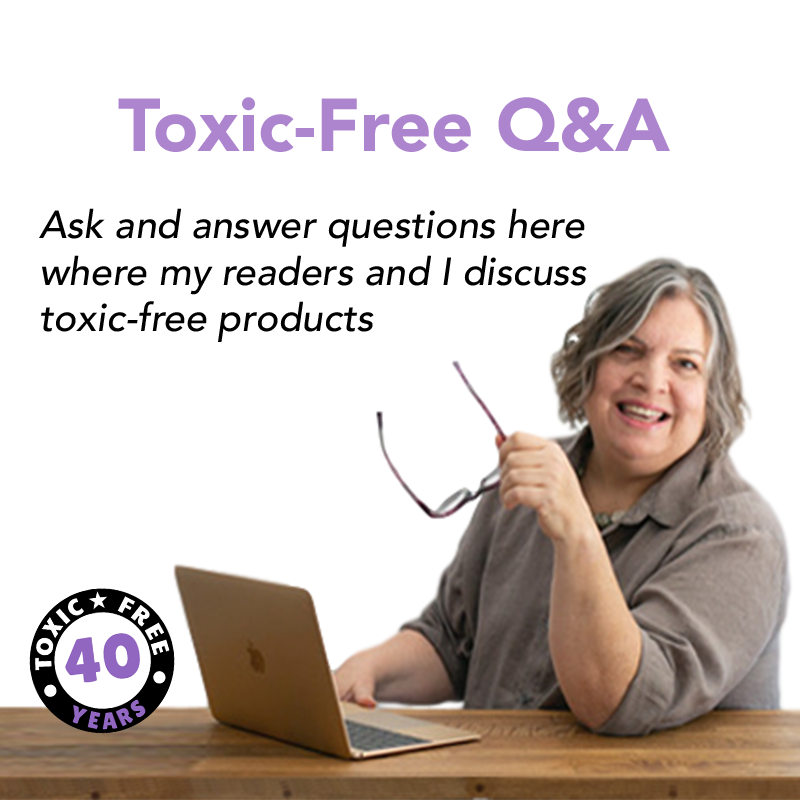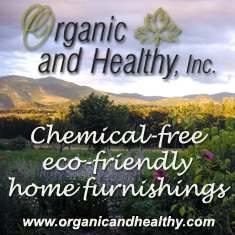
Submitted questions will be posted with my response by the following Tuesday or before.
Submitted comments will be moderated and approved within 24 hours.
Glycerin
Question from Joan Christensen
Dear Debra,
I can not find any information on Pears glycerin soaps, how beneficial or harmful it is to use them. I am confused about glycerin. Should I avoid glycerin soaps such as Pears?
Debra’s Answer
I went to the website for Pears Soap, which says it is a natural soap that has been made for almost 200 years. “It contains high quality skincare ingredients like glycerin and natural oils. Pears Soap is especially made to take care of even sensitive and delicate skin, cleansing thoroughly, yet gently and rinsing clean.It is hypo-allergenic, contains a mild cleansing formula and no colorants.”
However, they don’t give any ingredient and their Contact Us page was “not found” so I can’t tell you anything about the ingredients.
If you go to a store and look on the label, and post the ingredients here, I’ll comment on them.
Glycerin itself is fine to use. It is actually created by the soapmaking process. Industrially, it is usually skimmed off and used in lotions and the soap is sold without it. Most handmade soaps contain their natural glycerin because it is not removed.
There’s no need to avoid glycerin soaps, but watch out for the fragrances and other ingredients which might be added.
Natural starch
Question from Pram
Non Toxic Finish For Wooden Spoons Good to be here – I hope someone can help with this one. I am looking for a non-scented starch for cloth. A friend needs to sew with very slippery silk and it is much easier if the fabric is lightly starched first. But all starches have chemical smells added. Non Toxic Finish For Wooden Spoons Any non-scented starch out there? Non Toxic Finish For Wooden Spoons Thanks very much! Non Toxic Finish For Wooden Spoons May All Be Well
Debra’s Answer
Non Toxic Finish For Wooden Spoons Years ago I researched laundry starch and found out it was basically scented cornstarch. So I would try mixing cornstarch (or some other starch if you are allergic to corn) with water and spraying it on. Non Toxic Finish For Wooden Spoons Readers, any other suggestions?
Aluminum Oxide Finish On Mullican Hickory Enigneered Flooring
Question from Jim Blair
Debra, I had Mullican Sundance Hickory engineered hardwood floors installed in June 07. I noticed the box the flooring came in stated that the wood contained an aluminum oxide finish.
I have noticed an odor in the morning when I go downstairs. Is this because of the floor adhesive (Bostik) “gassing off” or something i.e. aluminum oxide in the floor finish “gassing off”? If so, do I have a toxic situation or is there some kind of remedy?
What do you recommend I do? Please help!
R/Jim
Debra’s Answer
I think it’s more likely the adhesive than the aluminum oxide. Aluminum oxide, to the best of my knowledge, has no gasses that outgas. Adhesives do.
I would heat up the room to speed the outgassing. Remove all people, plants, and pets and let it bake for a day and see if it’s better. Repeat until there is no more odor.
Realsalt
Question from Marie
I have come across a natural salt called “realsalt”. It’s very good, and is supposed to be 100% natural. I buy it in bulk, from a health food store, but not all health food stores carry it. You can also buy it directly from their website.
This is from their website:
“Long before the earth knew pollutants of any kind, a huge, ancient sea covered what is now North America. Pure, natural salt was the main ingredient of this sea, and over millions of years, the water in the sea evaporated, leaving the salt in undisturbed deposits. At some point during the earth’s Jurassic era, a range of volcanoes erupted around the ancient sea bed, sealing the salt with thick volcanic ash, protecting these precious deposits against the pollution that man would eventually introduce into the environment. Near the small town of Redmond, in central Utah, approximately 200 miles south of Salt Lake City, we carefully extract this salt from deep within the earth, and bring it to you in its pure, natural state–without any additives, chemicals, or heat processing. This is RealSalt®, full of flavor and natural goodness–the way salt was meant to be savored!”
It even contains Iodine, which, for me is essential, because of Thyroid problems.
What do you think about it?
Their website is: realsalt.com
Debra’s Answer
There’s much that can be said about salt, in fact, I’m working on a little book on the subject, but for the moment, this description of salt looks fine to me.
Personally, I use “The Original” Himalayan Crystal Salt, which is also from an ancient sea, but is completely mined and processed by hand to retain it’s energetic qualities. It has also been studied in Europe and found to have health benefits not found in table salt.
The Real Salt website says that it is “hand-selected” but that’s all. I don’t know how it has been processed.
Like anything else, there are degrees of good salt and bad salt. Refined sodium chloride table salt is the worst. Real Salt is certainly better as a whole, natural salt. Based on the information I have, I’d still put “The Original” Himalayan Crystal Salt at the top of the list.
Toothpaste and Nature’s Gate
Question from Joan Christensen
Hi Debra,
Could you recommend to me some choices for natural toothpaste?
I found some with Nature’s Gate called Nature’s Gate Organics Peppermint Whitening Toothpast with Flouride 5 oz. for $6.99. Also comes in Raspberry flavor. Do you recommend Nature’s Gate products?
I did not see this company in you list.
Thank you.
Debra’s Answer
If you haven’t already, I suggest you read the post on this blog Q&A: Tooth Soap, which talks a lot about toothpaste and other methods of cleaning teeth as well.
Just because a company is not listed on Debra’s List doesn’t mean it’s not a good company. I have many websites waiting to be added, as I only have so many hours in the day… 
That said, I just took a look at the Nature’s Gate website and right away there was a “red flag”–the statement “blending nature and science to benefit you and the Earth”. This generally means that the products are not 100% natural. That “sciene” part usually indicates the presence of man-made artificial ingredients.
Now I want to say some things here about these products, but I don’t want it to sound like I am picking on Nature’s Gate. These points apply to many so-called “natural” products.
You asked about toothpaste. I looked at the ingredients for Creme de Peppermint Natural Toothpaste, which is fluoride-free and contains baking soda. Both good. Also some natural flavorings, some herbal extracts, and sodium lauryl sulfate. Now sodium lauryl sulfate is one of those not-quite-natural ingredients that comes from a natural source, but is processed with chemicals. So it’s not, per se, 100% natural, but is considered natural by the natural product industry because it’s source is a plant ingredient. It’s about like adding pesticides to a plant, which is still considered natural to the natural products industry. Sodium laurel sulfate (SLS) is no longer considered safe and is being removed from many natural product formulations now. So, no, I wouldn’t put this toothpaste on Debra’s List. The best ingredient in this toothpaste is baking soda, so why not just brush your teeth with baking soda?
I also took a look at their new “organics” line. Now, if you look at the organic bodycare products on Debra’s List, you’ll find that most of the ingredients are organically grown. Nature’s Gate “Organics” Lavender & Aloe Nourishing Conditioner for All Hair Types has only one organic ingredient…the lavender. The rest are those not-quite-natural “science” ingredients.
Sensatia
Question from Joan
Hi Debra,
I have another question about a maker. There is a maker called Sensatia (www.sensatia.com) from Bali, Indonesia. Could you tell me if you would recommend products from that company?
Thanks.
Debra’s Answer
Looks good to me. I like that they list all their ingredients and even show pictures of the soap being made. These are definately “all natural” products.
The only thing for me, though, is that while they say they use organic ingredients, on the ingredients lists they don’t specify which are organic. It’s also not clear if they are 100% organic. It also doesn’t say they are certified organic. So these are my reservations.
I want to be clear that, personally, I am looking for the most organic products possible, so I’m pretty picky. But there is a whole spectrum of products that are better than the worst, most toxic, unhealthy products, and it’s better to use any one of those “better” products than the worst products.
These seem to be “much better” than most. They may even be exquisite. But all I have to go on is how they present themselves in their own website description.
How to Reduce, Reuse, and Recycle Plastic Grocery Bags
If you don’t live in San Francisco, where plastic grocery bags have been banned, you may still be facing that choice of paper or plastic at the checkout.
Personally, I bring my own canvas bag, or opt for paper. The inherently biodegradable paper bags get reused as garbage bags.
If you do have some plastic bags lying around or have a steady stream of them coming in, here’s a great resource for info about plastic bags, suggestions on how to reduce and reuse them, and where to recycle them (if your local store doesn’t already collect them back).
21st Century Citizen: 25 Resources to reduce, recycle and reuse plastic grocery bags
Speaking of bags, here’s a tip for upcoming holiday gift wrap. Yesterday I was talking with a reporter for a story about “Green Christmas” and we were talking about giving reusable bags as holiday gifts. She remarked that many of the big stores are now selling their own reusable bags with their logo on them. She had already purchased her husband’s Christmas gift at Home Depot and will be wrapping it in their reusable bag with the Home Depot logo. A great idea for reusable gift wrap.







